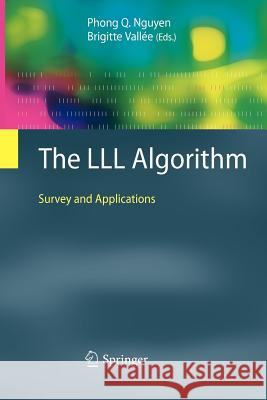The LLL Algorithm: Survey and Applications » książka
The LLL Algorithm: Survey and Applications
ISBN-13: 9783642261640 / Angielski / Miękka / 2012 / 496 str.
The LLL Algorithm: Survey and Applications
ISBN-13: 9783642261640 / Angielski / Miękka / 2012 / 496 str.
(netto: 881,78 VAT: 5%)
Najniższa cena z 30 dni: 886,75
ok. 16-18 dni roboczych.
Darmowa dostawa!
Computational aspects of geometry of numbers have been revolutionized by the Lenstra Lenstra Lovasz lattice reduction algorithm (LLL), which has led to bre- throughs in elds as diverse as computer algebra, cryptology, and algorithmic number theory. After its publication in 1982, LLL was immediately recognized as one of the most important algorithmic achievements of the twentieth century, because of its broad applicability and apparent simplicity. Its popularity has kept growing since, as testi ed by the hundreds of citations of the original article, and the ever more frequent use of LLL as a synonym to lattice reduction. As an unfortunate consequence of the pervasiveness of the LLL algorithm, researchers studying and applying it belong to diverse scienti c communities, and seldom meet. While discussing that particular issue with Damien Stehle at the 7th Algorithmic Number Theory Symposium (ANTS VII) held in Berlin in July 2006, John Cremona accuratelyremarkedthat 2007would be the 25th anniversaryof LLL and this deserveda meetingto celebrate that event. The year 2007was also involved in another arithmetical story. In 2003 and 2005, Ali Akhavi, Fabien Laguillaumie, and Brigitte Vallee with other colleagues organized two workshops on cryptology and algorithms with a strong emphasis on lattice reduction: CAEN 03 and CAEN 05, CAEN denoting both the location and the content (Cryptologie et Algori- miqueEn Normandie). Veryquicklyafterthe ANTSconference, AliAkhavi, Fabien Laguillaumie, and Brigitte Vallee were thus readily contacted and reacted very enthusiastically about organizing the LLL birthday conference. The organization committee was formed."
The LLL algorithm is a polynomial-time lattice reduction algorithm, named after its inventors, Arjen Lenstra, Hendrik Lenstra and László Lovász. The algorithm has revolutionized computational aspects of the geometry of numbers since its introduction in 1982, leading to breakthroughs in fields as diverse as computer algebra, cryptology and algorithmic number theory.§This book consists of 15 survey chapters on computational aspects of Euclidean lattices and their main applications. Topics covered include polynomial factorization, lattice reduction algorithms, applications in number theory, integer programming, provable security, lattice-based cryptography and complexity.§The authors include many detailed motivations, explanations and examples, and the contributions are largely self-contained. The book will be of value to a wide range of researchers and graduate students working in related fields of theoretical computer science and mathematics.











